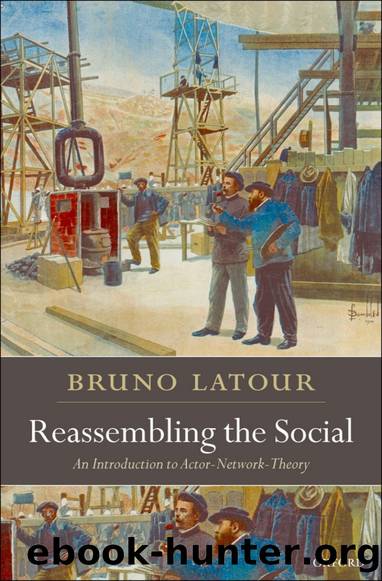Reassembling the Social by Bruno Latour

Author:Bruno Latour [Latour, Bruno]
Language: eng
Format: epub
ISBN: 9780199256044
Google: AbQSDAAAQBAJ
Publisher: Oxford University Press, Incorporated
Published: 2007-05-15T05:00:00+00:00
From Panopticon to Oligopticon
Myopic ANT scholars have a great advantage over sharp-sighted all-encompassing overseers. Not only can they ask gross and silly questions, they can do so obstinately and collectively. The first kind of clamp is the one obtained by this rather naive query: âWhere are the structural effects actually being produced?â I am aware that this geographic question shows a terrible lack of manners, but I am a science student and so, for any piece of scientific knowledge, I am used to supplying its indispensable conditions of production.223 For example, even linguists need a room, an office, an institution, a department, boxes of archives, a place to stay, a coffee pot, and Xerox machine so as to gather all the elements, which have been extracted from thousands of local interactions and millions of speech acts, and carefully fabricate a linguistic structure.224 And the same is true of lawyers: the system of law is compiled using folders, libraries, meetings, etc.225 Even Karl Marx in the British Library needs a desk to assemble the formidable forces of capitalism. No more than language or law, physiology lives a mysterious and ethereal life: it is always produced somewhere, in such and such laboratory at the Royal College of Surgeons, in a freshly revised textbook, in a doctorâs cabinet, after a consensus meeting has modified the standard procedure for taking care of sprained ankles. Culture does not act surreptitiously behind the actorâs back. This most sublime production is manufactured at specific places and institutions, be it the messy offices on the top floor of Marshal Sahlinsâs house on the Chicago University campus or the thick Area Files kept at the Pitts River museum in Oxford.226
Other sociologists may ignore these production sites as so many transparent intermediaries since, according to their epistemology, they play no other role than to reveal the âfundamental structuresâ of human actions, but historians and sociologists of science pay close attention. Ever since we decided to follow how matters of concern are generated by the various disciplines, we have to take into account the practical ways through which the knowledge of othersâ actions is being daily produced. Is this relativism? I hope so. If no signal travels faster than light, no knowledge travels without scientists, laboratories, and fragile reference chains. Our interest for those humble means is not dictated by suspicion about the true efficacy of those structures or by some reflexive urge. It is simply that they offer ideal tracers for discovering what sort of relationship may exist for good between the micro and the macro. If the whole of physical space and physical time had to be reshaped because of the realization that no two signals are really sent simultaneously, then how much more social space and time will have to be reshuffled once every structural feature is brought firmly back inside its local conditions of production?
And sure enough, as soon as the local sites that manufacture global structures are underlined, it is the entire topography of the social world that is being modified.
Download
This site does not store any files on its server. We only index and link to content provided by other sites. Please contact the content providers to delete copyright contents if any and email us, we'll remove relevant links or contents immediately.
Chaco's Northern Prodigies : Salmon, Aztec, and the Ascendancy of the Middle San Juan Region after AD 1100 by Paul F. Reed(379)
Digital International Relations by Unknown(375)
Law Enforcement Interpersonal Communication and Conflict Management by Brian Douglas Fitch(366)
Skilled interpersonal communication: Research, theory and practice, Fifth edition by Owen Hargie(355)
The Enduring Color Line in U.S. Athletics by Krystal Beamon Chris M. Messer(353)
Critical Perspectives on Human Security : Rethinking Emancipation and Power in International Relations by David Chandler; Nik Hynek(342)
EPSO CAST Political affairs EU policies: How to succeed in the selection procedure by Franco Reverte José María(329)
Evidence-Based Policy Making in Labor Economics by Hamermesh Daniel S.;Nottmeyer Olga K.;Nottmeyer Olga;King Sarah;King Sarah;King Sarah;(319)
Writing Public Policy - A Practical Guide to Communicating in the Policy Making Process by Catherine F. Smith(297)
Criminological Theory in Context by John Martyn Chamberlain(294)
Rothschild and Early Jewish Colonization in Palestine (Geographical Perspectives on the Human Past) by Ran Aaronsohn(292)
Positive Psychology and Spirituality in Counselling and Psychotherapy (Conflict, Ethics, and Spirituality, 12) by unknow(289)
Tibeton Yoga Its Secret Doc by Evans-Wentz(283)
Threshold Concepts in Women's and Gender Studies by Christie Launius Holly Hassel(279)
Social Problems, Social Issues, Social Science by James Wright(279)
Cognitive Development in Infancy and Childhood (Elements in Child Development) by Mary Gauvain(273)
Play in child development and psychotherapy: toward empirically supported practice by Sandra W. Russ(272)
Latin American Politics and Society by Gerardo L. Munck & Juan Pablo Luna(252)
The Arab Spring Abroad: Diaspora Activism against Authoritarian Regimes by Dana M. Moss(234)
